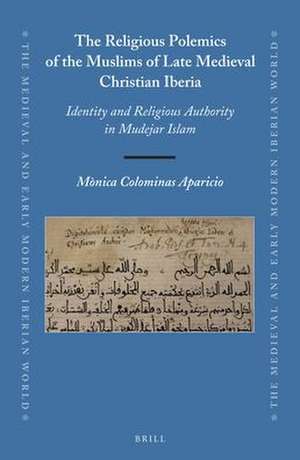The Religious Polemics of the Muslims of Late Medieval Christian Iberia: Identity and Religious Authority in Mudejar Islam: The Medieval and Early Modern Iberian World, cartea 64
Autor Mònica Colominas Aparicioen Limba Engleză Hardback – 25 apr 2018
Din seria The Medieval and Early Modern Iberian World
- 23%
 Preț: 1373.90 lei
Preț: 1373.90 lei - 23%
 Preț: 1713.55 lei
Preț: 1713.55 lei - 18%
 Preț: 721.37 lei
Preț: 721.37 lei - 18%
 Preț: 721.91 lei
Preț: 721.91 lei - 18%
 Preț: 721.29 lei
Preț: 721.29 lei - 18%
 Preț: 968.90 lei
Preț: 968.90 lei - 18%
 Preț: 723.17 lei
Preț: 723.17 lei - 18%
 Preț: 967.88 lei
Preț: 967.88 lei - 18%
 Preț: 1038.81 lei
Preț: 1038.81 lei - 18%
 Preț: 1178.21 lei
Preț: 1178.21 lei - 18%
 Preț: 731.25 lei
Preț: 731.25 lei - 18%
 Preț: 1253.54 lei
Preț: 1253.54 lei - 18%
 Preț: 1621.85 lei
Preț: 1621.85 lei - 18%
 Preț: 996.78 lei
Preț: 996.78 lei - 18%
 Preț: 860.37 lei
Preț: 860.37 lei - 18%
 Preț: 1024.24 lei
Preț: 1024.24 lei - 18%
 Preț: 718.14 lei
Preț: 718.14 lei - 18%
 Preț: 655.97 lei
Preț: 655.97 lei - 18%
 Preț: 603.19 lei
Preț: 603.19 lei - 18%
 Preț: 867.45 lei
Preț: 867.45 lei - 18%
 Preț: 969.32 lei
Preț: 969.32 lei - 18%
 Preț: 953.44 lei
Preț: 953.44 lei - 18%
 Preț: 926.77 lei
Preț: 926.77 lei - 18%
 Preț: 861.74 lei
Preț: 861.74 lei - 18%
 Preț: 816.11 lei
Preț: 816.11 lei - 18%
 Preț: 624.73 lei
Preț: 624.73 lei - 18%
 Preț: 790.58 lei
Preț: 790.58 lei - 18%
 Preț: 806.97 lei
Preț: 806.97 lei - 18%
 Preț: 743.89 lei
Preț: 743.89 lei - 18%
 Preț: 630.05 lei
Preț: 630.05 lei - 18%
 Preț: 833.32 lei
Preț: 833.32 lei - 18%
 Preț: 630.05 lei
Preț: 630.05 lei - 18%
 Preț: 712.25 lei
Preț: 712.25 lei - 18%
 Preț: 638.49 lei
Preț: 638.49 lei - 18%
 Preț: 1121.94 lei
Preț: 1121.94 lei - 18%
 Preț: 738.96 lei
Preț: 738.96 lei - 18%
 Preț: 1427.21 lei
Preț: 1427.21 lei - 18%
 Preț: 606.10 lei
Preț: 606.10 lei - 18%
 Preț: 684.15 lei
Preț: 684.15 lei - 18%
 Preț: 705.47 lei
Preț: 705.47 lei - 18%
 Preț: 607.66 lei
Preț: 607.66 lei - 18%
 Preț: 688.71 lei
Preț: 688.71 lei - 18%
 Preț: 526.24 lei
Preț: 526.24 lei - 18%
 Preț: 547.95 lei
Preț: 547.95 lei - 18%
 Preț: 789.89 lei
Preț: 789.89 lei - 18%
 Preț: 706.26 lei
Preț: 706.26 lei
Preț: 698.83 lei
Preț vechi: 852.23 lei
-18% Nou
Puncte Express: 1048
Preț estimativ în valută:
133.73€ • 140.26$ • 111.32£
133.73€ • 140.26$ • 111.32£
Carte indisponibilă temporar
Doresc să fiu notificat când acest titlu va fi disponibil:
Se trimite...
Preluare comenzi: 021 569.72.76
Specificații
ISBN-13: 9789004346352
ISBN-10: 900434635X
Dimensiuni: 155 x 235 mm
Greutate: 0.72 kg
Editura: Brill
Colecția Brill
Seria The Medieval and Early Modern Iberian World
ISBN-10: 900434635X
Dimensiuni: 155 x 235 mm
Greutate: 0.72 kg
Editura: Brill
Colecția Brill
Seria The Medieval and Early Modern Iberian World
Cuprins
AcknowledgmentsList of FiguresNote on Transliteration, Conventions and AbbreviationsIntroductionMudejar PolemicsScholarship on the Mudejars and Their LiteratureMain Questions and Chapter Overview1 The Connection between Religious Polemics and Notions of Identity and Religious Authority among the MudejarsIntroduction1.1The Sacred Law, or Sharīʿa1.2The Relationship of the Mudejars with Jews and Christians1.3The Mudejar AljamasConclusions2 Concepts and Methods for the Study of Religious Authority and Identity in the Religious Polemics of the MudejarsIntroduction2.1Recent Approaches to Religious Polemics2.2Towards a Definition of Mudejar Polemics2.3Theoretical Framework and MethodsConclusions3 Previous Research and Identification of the Mudejar Polemical Sources to be Discussed in the Present Study3.1Twentieth- and Twenty-First Century Scholarly Views on Mudejar Manuscripts of Religious Polemics3.2Mudejar Polemical Sources3.3The Sources of the Kitāb al-Mujādala3.4The Place of the Copying of the Kitāb al-Mujādala: The Geographical Location of PiṭrūlaConclusions4 Muslim Literature of Religious PolemicsIntroduction4.1al-Andalus4.2Christian Iberia4.3The Maghreb4.4The MashriqConclusions5 Mudejar Polemics with the JewsIntroduction5.1The Taʾyīd5.2The Kitāb al-Mujādala5.3The “demandas” [Questions]Conclusions6 Mudejar Polemics with the ChristiansIntroduction6.1The Kitāb al-Mujādala6.2Religious Authority in the Kitāb al-Mujādala6.3An Ethical-Centred Model for Islam in the Kitāb al-Mujādala6.4Political Philosophy in the Kitāb al-MujādalaConclusions7 Mudejar Polemics as a Discursive TraditionIntroduction7.1Mudejar Identity in Polemics7.2Religious Leadership7.3Notions of Minority Identity and Government among the MudejarsConclusionsConclusionsManuscript Description of the Kitāb al-Mujādala (MS AF 58)Codicological DescriptionBibliographySource Overview
Annex
MS BNE 4944, ff. 1r–36r: Transcription and Rendering into Modern SpanishMS L 536, ff. 123v–125r: Transcription and Rendering into Modern SpanishReferencesIndex of Names and PlacesNotă biografică
Mònica Colominas Aparicio, Ph.D. (2016), University of Amsterdam, is Research Fellow at the Max Planck Institute for the History of Science in Berlin (Department I), and a core member of the Institute's interdisciplinary project Convivencia: Iberian to Global Dynamics, 500-1750.
